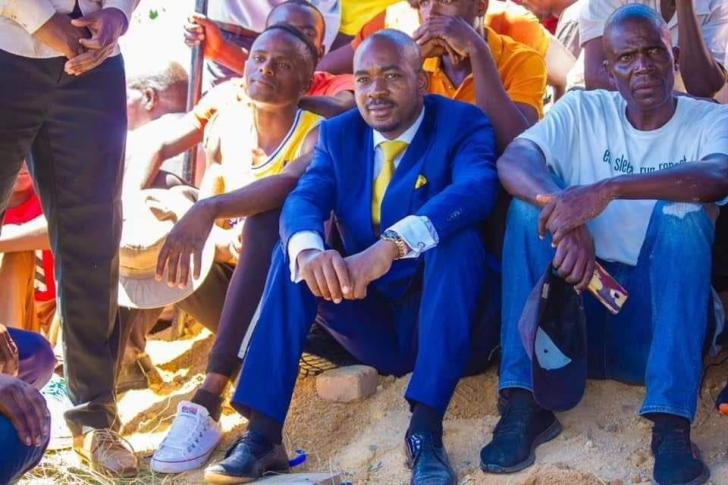News / National
Chamisa's 'bereka mwana' candidate selection method haunts CCC
28 Sep 2024 at 11:17hrs |
0 Views

Citizens Coalition for Change (CCC) spokesperson Willias Madzimure has attributed the all-male representation in constituencies like Tsholotsho in Matabeleland North to the party's controversial Bereka Mwana selection method employed during the 2023 elections. This method has sparked significant concerns regarding gender imbalance and representation within the party.
Madzimure explained that the Bereka Mwana approach, which required voters to queue behind their preferred candidates, disproportionately impacted female candidates, making it particularly challenging for women to secure elected positions. "We had a challenge during elections. In fact, the whole country had such a problem. As a party, we used a method called Bereka mwana, which is what made it tough for women who were contesting," he told Southern Eye.
He also pointed to socio-economic factors that hinder women's political participation, noting that many women must seek permission from their husbands to stand for election and often rely on their families for financial support. "Another challenge is the economic set-up, where most women have to first discuss with the husband for permission to be part of the contestants," Madzimure added.
To address these issues, Madzimure urged political parties to establish supportive frameworks for women, including financial backing and empowerment initiatives to facilitate their participation in elections. "Parties should also empower their women so that they will be able to contest. They are always met by such impediments when it's election time," he stated.
The discussion surrounding women's representation in Zimbabwe gained traction earlier this year during Women's History Month, especially as statistics highlighted the glaring disparity between the female population and their representation in governance. According to the 2022 Zimbabwe National Statistics Agency census, women make up 54% of the country's population and approximately half of the electorate. However, only 22 women (10%) were directly elected to the National Assembly out of 210 available seats, underscoring a significant underrepresentation of women in governance.
The Parliament of Zimbabwe is bicameral, consisting of the Senate and the National Assembly. The National Assembly comprises 280 members, including 210 elected directly from geographic constituencies, while the remaining seats are reserved for women and youth quotas. The Senate, the upper house, consists of 80 members, with 60 elected by proportional representation and the rest reserved for chiefs and persons with disabilities.
Madzimure's remarks highlight the ongoing struggle for gender equality in Zimbabwe's political landscape and call for a reevaluation of electoral methods to ensure fair representation for all citizens.
Madzimure explained that the Bereka Mwana approach, which required voters to queue behind their preferred candidates, disproportionately impacted female candidates, making it particularly challenging for women to secure elected positions. "We had a challenge during elections. In fact, the whole country had such a problem. As a party, we used a method called Bereka mwana, which is what made it tough for women who were contesting," he told Southern Eye.
He also pointed to socio-economic factors that hinder women's political participation, noting that many women must seek permission from their husbands to stand for election and often rely on their families for financial support. "Another challenge is the economic set-up, where most women have to first discuss with the husband for permission to be part of the contestants," Madzimure added.
To address these issues, Madzimure urged political parties to establish supportive frameworks for women, including financial backing and empowerment initiatives to facilitate their participation in elections. "Parties should also empower their women so that they will be able to contest. They are always met by such impediments when it's election time," he stated.
The discussion surrounding women's representation in Zimbabwe gained traction earlier this year during Women's History Month, especially as statistics highlighted the glaring disparity between the female population and their representation in governance. According to the 2022 Zimbabwe National Statistics Agency census, women make up 54% of the country's population and approximately half of the electorate. However, only 22 women (10%) were directly elected to the National Assembly out of 210 available seats, underscoring a significant underrepresentation of women in governance.
The Parliament of Zimbabwe is bicameral, consisting of the Senate and the National Assembly. The National Assembly comprises 280 members, including 210 elected directly from geographic constituencies, while the remaining seats are reserved for women and youth quotas. The Senate, the upper house, consists of 80 members, with 60 elected by proportional representation and the rest reserved for chiefs and persons with disabilities.
Madzimure's remarks highlight the ongoing struggle for gender equality in Zimbabwe's political landscape and call for a reevaluation of electoral methods to ensure fair representation for all citizens.
Source - southern eye
Join the discussion
Loading comments…


































